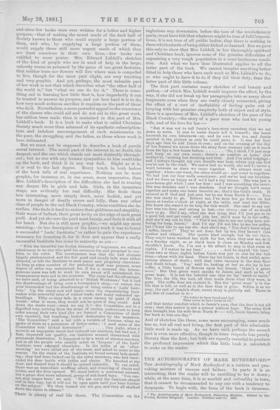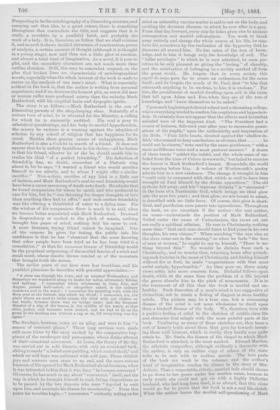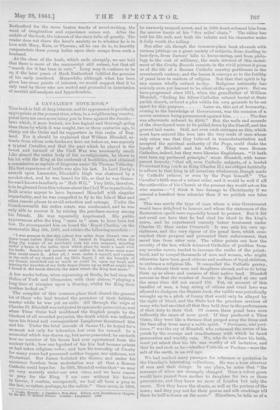THE AUTOBIOGRAPHY OF MARK RUTHERFORD:*" THE Autobiography of Mark Rutherford
is a curious and pro- voking mixture of success and failure. In parts it is so interesting, that the reader will be unwilling to lay it down ;: while, at the same time, it is so morbid and unhealthy in tone,. that it cannot be recommended to any one with a tendency to dyspepsia. To begin with, the form of the book is tiresome..
• The Autobiography of Mark Rutherford, Dissenting Minister. Edited by his: Friend, Reuben Elhapoott. London Trabner and Co. 1881. Purporting to be the autobiography of a Dissenting minister, and carrying out that idea to a great extent, there is something throughout that contradicts the title, and suggests that it is really a novelette by a youthful hand, and probably the work of a lady. It is, therefore, as fiction that we shall criticise it, and as such it shows decided cleverness of construction, power of analysis, a certain amount of thought (although it is thought in a young stage), now and then not a little glow of emotion, and almost a total want of imagination. As a novel, it is poor iu plot, and the secondary characters are not much more than outline sketches. Still, this may be somewhat excused, on the plea that broken lines are characteristic of autobiographical novels, especially when the whole interest of the book is made to centre on the analysis of one man's mind. What is especially evident in the book is, that the author is writing from personal experience; and if so, deserves the keenest pity, as never did man or woman suffer more profound misery than the unlucky Mark Rutherford, with his sceptical brain and dyspeptic spirits.
The story is as follows :—Mark Rutherford is the son of Dissenting parents of the shop-keeping class. Naturally of a serious turn of mind, ho is educated for the Ministry, a calling for which ho is eminently unfitted. His soul a prey to atheistical questionings, and his body to morbid hypochondria, the misery he endures is a warning against the adoption of atheism by any school of religion that has happiness for its creed. Besides these greater causes of unhappiness, Mark Rutherford is also a Ccolebs in search of a friend. It does not appear that ho is unduly fastidious in his choice,—all he desires is that his friend, whoever be or she be, should enable him to realise his ideal " of a perfect friendship." His definition of friendship has, no doubt, somewhat of a Platonic ring about it, for he says, "I wanted a friend who would sacrifice himself to me utterly, and to whom I might offer a similar sacrifice." Now-a-days, sacrifice of any kind is a little out of fashion, and Mark. Rutherford's soul-to-soul friendship would have been a union savouring of death unto death. He admits that Ire found companions for whom he cared, and who professed to care for him, but he " was thirsting for deeper draughts of love than anything they had to offer," and such surface friendship was like offering a thimbleful of water to a dying man. For the wisdom of his companions there is much to be said, when we become better acquainted with tfark Rutherford. Drowned in despondency or excited to the pitch of mania, nothing brought him peace of mind, nothing laid his cares to rest.
A more tiresome, trying friend cannot be imagined. One of the reasons he gives for taking the public into his confidence is that he has "observed that the mere knowing
that other people have been tried as he has been tried is a consolation ;" so that his 81GM71LUNt bon? ii of friendship would
be the perpetual outpouring of the morbid fancies of a weak and small mind, whose chaotic throes remind us of the mountain that brought forth the mouse.
The earlier years of our hero were less troublous, and his youthful pleasures he describes with graceful appreciation :—
" A river ran through the town, and on summer Wednesdays and Saturdays wo wandered along its banks for miles, alternately fishing and bathing. I remember whole afternoons in Juno, July, and August, passed half-naked, or altogether naked, in the solitary meadows and in the water ; I remember the tumbling weir, with the deep pool at the bottom, into which we dived ; I remember, too, the place whore we used to swim across the river with our clothes on our heads, because there was no bridge near; and the frequent disaster da slip of the braces in the middle of the water, so that shirt, jacket, and trousers were soaked, and we had to lie on the grass in the broiling sun without a rag on us, till everything was dry again."
The Sundays, however, come as an alloy, and were to him "a season of unmixed gloom." Three long services were made still more bitter by the envy excited by the comparative hap- piness of the carekeeper and pew-opener, whose duties-allowed of their occasional movement. At home, the theory of the day was carried out in cold dinners, with only an occasional back- sliding towards " aboiled suet-pudding, which cooked itself," and which we will hope was enlivened with cold jam. These childish joys and sorrows soon came to an end, and the more serious business of life opened for Mark Rutherford about fourteen, when . it was intimated to him that it was time "he became converted." Of course, he has much to say about " couversiou " itself, and the way in which he brought himself to such fitting dispositions as to be passed by the two deacons who were "deputed to wait upon him, and ascertain his fitness for membership." From this ' point his troubles begin,—" conversion " evidently acting on his mind as unhealthy vaccine matter is said to act on the body, and exciting the dormant diseases to which he ever after is a prey.
From that day forward, every step he takes gives rise to anxious retrospection and morbid self-analysis. Too weak to break away entirely and change the whole course of his life, he com- forts his conscience by the realisation of the hypocrisy that he discovers all around him. He has eaten of the tree of know- ledge, and to him it brings only the knowledge of evil. The "fuller privileges " to which he is now admitted, he soon per.
Ceives to be only pleasant as giving the " feeling " of c]anship, and the satisfaction of belonging to a society marked off from the great world. He forgets that in every society this
esprit de corps goes far to create an enthusiasm for the cause itself; and he forgets the words of St. Paul, that "to him that
esteemeth anything to be unclean, to him it is unclean." For him, the punishment of morbid dwelling upou self is the curse that fell upon Adam and Eve, when they ate of the tree of knowledge, and "know themselves to be naked."
Upon such beginnings followed school and a dissenting college, where everything tended to confirm his scepticism and hypochon- dria. It certainly does not appear that the efforts used to combat unbelief were of the happiest kind. " The President had a course of lectures, delivered year after year to successive gener- ations of his pupils," upon the authenticity and inspiration of the Bible. " Prim little tracts, directed against the shallow in-
fidel,' who seemed to deny conclusions so obvious, that he could not be sincere," were read by the same gentleman, " with a most mellifluous voice and a most pastoral manner." A dozen of these tracts " settled the infidel, and the whole mass of un- belief from the time of Celsus downwards," but failed to exorcise the demon in Mark Rutherford's breast. Meanwhile, the world was opening before him. A volume of Wordsworth's poetry admits him to a new existence. The change it wrought in him " could only be compared with that which is said to have been wrought on Paul himself by the divine apparition." The old systems fall away, and his " supreme divinity " is " recreated " in the form of a Pantheistic Cod, which brings an ideal glow into the next few years ; and that glow, we are bound to admit, is described with no little force. Of course, this glow is short- lived, and pantheism soon passes into agnosticism. Throughout the book, we are uncertain if the author—the real author, we mean—understands the position of Mark Rutherford. Veiled under the name of Uuitarianism, the views set out are really a spiritual atheism. He sees in Christianity nothing more than " that each man should learn to find peace in his own thoughts, his own visions." When watching "the sun rise, or the stars come out in the evening," or when he feels "the love of man or woman," he ought to say to himself, "There is no- thing beyond this." No wonder lie shrinks from such a Christianity, and no wonder that, returning home after preach- ing such doctrine in the name of Christianity, and finding himself without fire or food, he made " acquaintance with that most awful malady, hypochondria." As time goes on, these misty views settle into more concrete form. Disbelief follows upon doubt, while at the same time the problem of a life beyond the grave absorbs him to the pitch of monomania. It is in the treatment of all this that the book is morbid and un- healthy. Such dissection of a man's mind is too suggestive of vivisection, not to create a feeling of disgust in more healthy minds. The picture may be a true ono, but a consuming disease of the mind is not more wholesome to dwell upon than a kindred disease of the body. We, therefore, turn with a positive feeling of relief to the sketches of middle-class life and character that mingle with the more painful parts of the book. Unalluring as many of these sketches are, they have a sort of homely truth about them that goes far towards invest- ing them with humour, which in reality they hardly ever quite attain to. Mr. Smile, the deacon of the chapel to which Mark Rutherford is attached, is the most marked. Edward Mardon, the atheistic compositor, although evidently a favourite with . the author, is only an outline copy of others of the same tribe to be met with in endless novels. The love parts of the book are weak in the extreme, and the author's want of imagination reaches its climax in the story of Mrs. Arbour. That a respectable, elderly, married lady should choose to go down to her grave under her maiden name, because in early youth she could not get on with a highly Philistine husband, who had long been dead, is so absurd, that this alone would go far to prove that the book is not a real life-sketch. When the author leaves the morbid self-questioning of Mark Rutherford for the more beaten tracks of novel-writing, the want of imagination and experience comes out. After the middle of the book, the interest of the story falls off greatly. The reader does not share the hero's anxiety as to whether he is in love with Mary, Kate, or Theresa ; all he can do is, to heartily congratulate these young ladies upon their escape from such a husband.
At the close of the book, which ends abruptly, we are told that there is more of the manuscript still extant, but that all "search for it has been in vain." Long may it continue to be so, if the later years of Mark Rutherford fulfilled the promise of his early manhood. Meanwhile, although what has been given has some points of interest, we would suggest that it be only read by those who are rooted and grounded in detestation of morbid self-analysis and hypochondria.




































 Previous page
Previous page